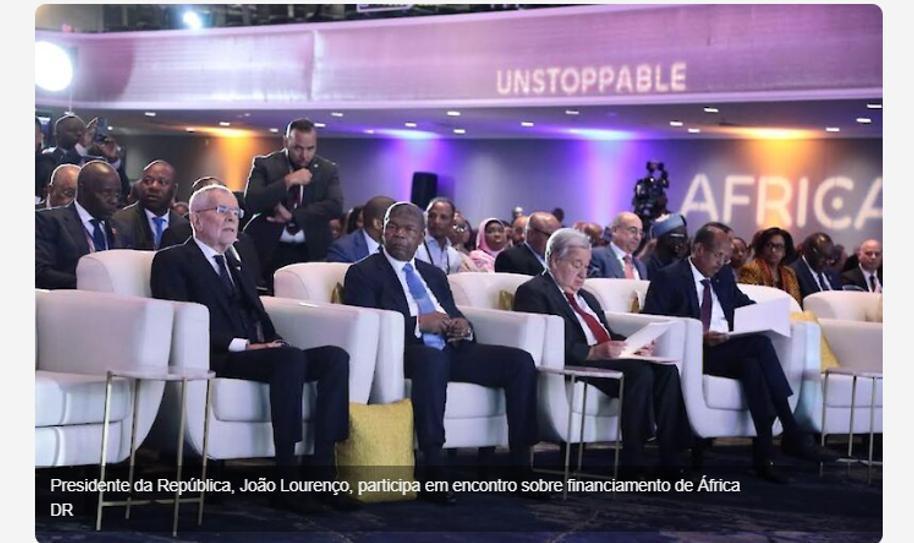Africa-Press – Mauritius. Africa has unique conditions to achieve its economic development goals, based on its abundant natural resources, young and dynamic population, and rapidly growing consumer markets, Angolan President and Chairperson of the African Union (AU), João Lourenço, stated Sunday in New York.
Speaking at the United Nations-African Union High-Level Dialogue Roundtable, João Lourenço said that the African continent’s capacity is also based on its rapidly growing consumer markets, which gives it unique conditions to attract investment, generate added value, and consolidate regional value chains.
He emphasized that in a world marked by profound geopolitical and economic instability, Africa can assert itself as a strategic partner with considerable specific weight, “if we look at the AU’s Agenda 2063, which reflects the ambition to transform the continent through industrialization, infrastructure modernization, regional integration, and improving the social well-being of its populations.”
At the roundtable, part of the event organized by the Global Business Initiative for Africa (GABI), the AU leader emphasized that Africa is recognized as a continent with great potential, but it cannot be viewed solely from this perspective, as it is increasingly becoming a space for transformative decisions and concrete projects.
He emphasized that these projects embody structuring initiatives that extend from the Atlantic to the Indian Ocean and from North to South, shaping a new African economic landscape, which includes the Lobito Corridor, as a benchmark for, among other things, regional connectivity and productive integration. “This is a framework that clearly signals to us that more than just a future destination, Africa is already a present reality of opportunities and growth,” stressed João Lourenço, during the roundtable discussion, which included the participation of the Secretary-General of the United Nations, António Guterres, the Deputy Secretary-General of the UN, Amina Mohamed, and the President of the African Union Commission, Mahamoud Ali Youssouf.
He said it is in this context that many African states, aware of Africa’s potential, have implemented structural reforms that reinforce the continent’s attractiveness, focusing their efforts on modernizing infrastructure, streamlining administrative processes, strengthening transparency and good governance, consolidating macroeconomic stability, and progressively diversifying national economies.
According to the President, many factors enhance Africa’s ability to move forward in its development efforts, most notably the African Continental Free Trade Area (AfCFTA).
João Lourenço emphasized that the AfCFTA represents the greatest economic opportunity of our time, with an integrated market of over 1.3 billion consumers and a Gross Domestic Product exceeding three trillion dollars, offering the continent’s private sector, and beyond, unique conditions to invest, expand operations, and prosper in security.
“By eliminating tariff barriers, harmonizing regulatory frameworks, and promoting regional value chains, the AfCFTA creates a favorable environment for investments that not only ensure solid financial returns, but also boost industrialization, the generation of skilled jobs, and the retention of wealth in Africa, consolidating the foundation for inclusive and sustainable growth,” he said.
Accordingly, the President of the African Union invites investors to look to Africa not only as a supplier of raw materials, but as the new frontier of productive transformation, technological innovation, and global competitiveness, in line with the vision of the African Union’s Agenda 2063 – “The Africa We Want.”
He reiterated that the private sector plays a central role as a driver of innovation, job creation, and economic diversification, constituting an indispensable partner in building Africa’s future.
For João Lourenço, the pattern of investments in the African continent, concentrated predominantly in extractive industries, with limited impact on structural development and the well-being of the population, must be abandoned, to make way for the promotion of strategic partnerships.
He stated that these partnerships will bring “undoubtedly reciprocal benefits and will contribute not only to the modernization of infrastructure, but also to the dynamization of productive and industrial transformation, which will surely have a positive impact on the global economy.”
Our vision in Africa, he said, points to the need and urgency of shifting the focus from simply exporting raw materials to a paradigm that encourages private sector investment in agro-industrial value chains, in mining with greater incorporation of added value, and in productive transformation sectors that promote the generation of skilled jobs, the strengthening of regional competitiveness, and the retention of wealth within the continent.
… According to João Lourenço, Public-Private Partnerships (PPPs) play a decisive role by allowing private capital to finance, operate and expand critical infrastructure in the areas of energy, transport, telecommunications and water, a model that would help reduce pressure on public budgets, accelerate access to essential services and generate lasting impacts on economic and social development.
“I believe that the benefits that would arise from this interaction between the State and the private sector would free up public energy, capacity and resources that would be used to resolve social problems and many others related to them,” he concluded.
For More News And Analysis About Mauritius Follow Africa-Press







